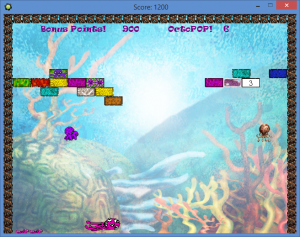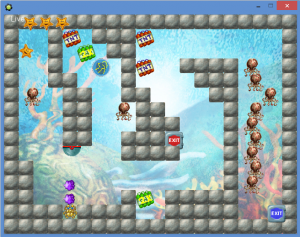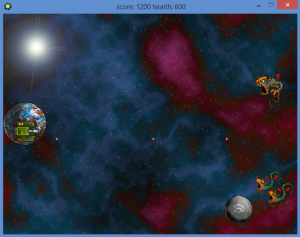
This just in from Ms. Evelti!
Last year when I began teaching my dream class, Video Game Programming & Design, my goal was not only to teach a lot about programming, but to also allow students’ creativity and enthusiasm for game play to drive much of their learning. The way I’ve chosen to accomplish this goal is to follow a formula for each unit in the class. We start with instructions for making a new game, following them step by step and pausing along the way to discuss new concepts and assess our understanding.
 Once we’ve broken, fixed, and perfected the prescribed game, the (virtual) walls come down and I assign students “mods,” or modifications, of the game. The first time I assign a mod the students tend to dream *very* big, way bigger than two weeks’ worth of class will enable them to achieve. While this first smack against the reality of being a newbie stings, it generates the swell of motivation that propels us through the rest of the term. When I read the proposals my students submit for the second, third, and even fourth mod of the term, I see them dial their creativity back markedly as they self-edit based on their understanding of their understanding. I see humble restraint replace naïve enthusiasm, and while I appreciate this appropriate academic response, it totally bums me out.
Once we’ve broken, fixed, and perfected the prescribed game, the (virtual) walls come down and I assign students “mods,” or modifications, of the game. The first time I assign a mod the students tend to dream *very* big, way bigger than two weeks’ worth of class will enable them to achieve. While this first smack against the reality of being a newbie stings, it generates the swell of motivation that propels us through the rest of the term. When I read the proposals my students submit for the second, third, and even fourth mod of the term, I see them dial their creativity back markedly as they self-edit based on their understanding of their understanding. I see humble restraint replace naïve enthusiasm, and while I appreciate this appropriate academic response, it totally bums me out.
 Sometime towards the end of the term, however, as the students’ project folders get fuller and skill sets widen, as confidence is built based on successful programming challenges, and as students look at old-style arcade games and exclaim, “I could totally make that!” I grow gleeful as I anticipate students’ proposals for their final mod project. I keep the requirements for the project modest and attainable, but encourage as much creativity as each student can muster. I raise the stakes by requiring each student to present their work to the class during our final meeting, including a live play-test by a classmate. How could you phone it in with your game-designer street cred on the line? You can’t. So the students rise to the challenge. They create new graphics, design new levels, and test out new code they haven’t learned yet. They leaf through chapters in the book that aren’t covered in the class. They read the documentation. They read the documentation!! They Go. For. It.
Sometime towards the end of the term, however, as the students’ project folders get fuller and skill sets widen, as confidence is built based on successful programming challenges, and as students look at old-style arcade games and exclaim, “I could totally make that!” I grow gleeful as I anticipate students’ proposals for their final mod project. I keep the requirements for the project modest and attainable, but encourage as much creativity as each student can muster. I raise the stakes by requiring each student to present their work to the class during our final meeting, including a live play-test by a classmate. How could you phone it in with your game-designer street cred on the line? You can’t. So the students rise to the challenge. They create new graphics, design new levels, and test out new code they haven’t learned yet. They leaf through chapters in the book that aren’t covered in the class. They read the documentation. They read the documentation!! They Go. For. It.
 The drafts of each students’ final mod proposals are rolling in to the open drop box on my learning management system, right now, as I type this. On Thursday, when the proposals are due, I’ll open the class website and stare for a moment at the little green flags that indicate a submission lined up in the gradebook like a nerdy advent calendar. I’ll click each little box of wonder and possibility, savoring the contents of each before I move on to the next, and reacquaint myself with those big-dreamers as I count down to the big day.
The drafts of each students’ final mod proposals are rolling in to the open drop box on my learning management system, right now, as I type this. On Thursday, when the proposals are due, I’ll open the class website and stare for a moment at the little green flags that indicate a submission lined up in the gradebook like a nerdy advent calendar. I’ll click each little box of wonder and possibility, savoring the contents of each before I move on to the next, and reacquaint myself with those big-dreamers as I count down to the big day.

